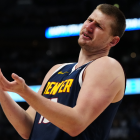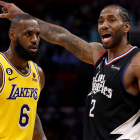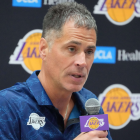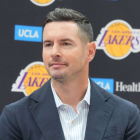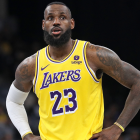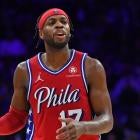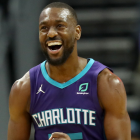
Paul George is going to Philadelphia. Klay Thompson is going to Dallas. LeBron James is heading back to the Lakers (but maybe only for one season). Free agency is more than off and running -- it's darn near over. Only a few obvious offseason questions remain: Where will DeMar DeRozan end up? Will Lauri Markkanen and/or Brandon Ingram be traded? If so, where?
Looking at everything we've seen so far, below are the offseason winners and losers. Understand: This is a fluid list. Things can change quickly. But here's how it looks at the moment.
Winner: Philadelphia 76ers
The Sixers are winners by landing George, who fits neatly in their starting lineup between fellow All-Stars Joel Embiid and Tyrese Maxey, who signed his own $204M extension. George will almost certainly be the best player to change teams in free agency, and his addition makes the Sixers one of the NBA's top title contenders behind the reigning champion Celtics.
A report in recent weeks indicated the 76ers' interest in George was cooling, but that never made much sense. The fit here is obvious. The Sixers needed an impact wing and had no issue giving George a fourth year on his contract, something the Clippers apparently refused to do.
In addition, the Sixers add Eric Gordon for shooting and Andre Drummond as an Embiid backup, and they re-signed Kelly Oubre, who was terrific for them last season and could be even better this season without as much required of him offensively with George on board.
Loser: Los Angeles Clippers
The Clippers lost Paul George to the 76ers because they were unwilling to max out his contract for the full four years. In the end, they were more fearful of the second apron, and the roster-building penalties that it carries, than they were of losing George for nothing.
The Clippers reportedly had a trade opportunity for George with the Warriors that would've at least brought back some valuable stuff, including a first-round pick and Jonathan Kuminga -- but it would've come with a $30M Chris Paul commitment that would've probably put them over the second apron anyway.
Sending PG to a conference rival like Golden State probably wasn't a very popular idea either. So George, who cost the Clippers Shai Gilgeous-Alexander, is gone for nothing. But look on the bright side ... you still get to pay Kawhi Leonard, who will never be healthy, and James Harden, who hasn't been worth his salary for his last three teams and will only get worse, almost a quarter billion dollars over the next three years!
It's not entirely a lost cause. The Clips added defense with Derrick Jones Jr. and rotational depth with Nic Batum, Kevin Porter, Kris Dunn and Mo Bamba. That notwithstanding, still being tied to Leonard and Harden feels like rehiring the captains of a ship that's already sunk.
Winner: New York Knicks
In a vacuum, Mikal Bridges isn't worth five first-round picks and another swap. But in the context of this Knicks team, he is. With OG Anunoby re-signed, the Knicks are one of the few teams that can match the Celtics' blueprint of a whole squad of top-shelf perimeter defenders funneling scorers toward an elite rim protector, which will likely be Mitchell Robinson with Isaiah Hartenstein on his way to Oklahoma City. It's impossible to overstate how much Bridges elevates this already very good team.
Offensive clarity, which would've been a real problem had the Knicks gone traditional star hunting, can be retained around Jalen Brunson as the unrivaled alpha with Bridges slotting back into a more natural role of secondary scorer and deadly floor spacer. New York also did good work in the draft by trading for a bunch of second-round picks that provide them with more financial flexibility as their payroll sets to balloon when Bridges and Brunson become eligible for extensions. Second-round pick Tyler Kolek could also end up being an immediate contributor as a Brunson backup.
The only downer is losing Hartenstein to the Thunder -- and it's a big downer. But it was also expected as the Knicks were only able to offer Hartenstein a first-year salary of $16.1M and a four-year max total of $72.5M because they only had his early Bird rights. The Thunder gave him $87M over three years for an average annual salary of nearly $30M. The good news is the Knicks still have Mitchell Robinson, who does everything Hartenstein does as a rim protector and historic offensive rebounder. New York is still having an incredible summer.
Winner: Oklahoma City Thunder
New York's loss is Oklahoma City's win in Isaiah Hartenstein, who almost single-handedly fixes OKC's rebounding problem (pretty much the only hole the team had) while adding a second elite rim protector next to Chet Holmgren. OKC can now rotate a big-time center for the full 48 minutes and the two can also play together in super-big lineups given Holmgren's ability to space out to the 3-point line. Incredible signing.
And it comes on the heels of another massive defensive addition in Alex Caruso, who comes over from the Bulls for Josh Giddey, who was out of place on this team anyway. OKC's defense was already super stout, and now you add Caruso to Lu Dort, Jalen Williams, Shai-Gilgeous-Alexander and Cason Wallace on the perimeter, with Holmgren and Hartenstein on the back end? Oklahoma City just became the favorite to win the West. I don't care if the odds don't reflect it yet.
Winner: Golden State Warriors
Klay Thompson is gone to the Mavericks and Golden State wasn't able to turn Chris Paul into anything on the trade market -- which, by extension, means they also didn't get anything for Jordan Poole in hindsight. They struck out on Paul George. These are losses by any standard.
But the Warriors have quietly made some pretty nice moves to fill out the roster. First they got De'Anthony Melton, then Kyle Anderson, and now it looks like Buddy Hield could be on the way. In essence, Golden State would be using the traded-player exception created by the Thompson sign-and-trade with Dallas to split on Anderson and Hield. Those two guys are just flat out more valuable to the Warriors than Thompson was, and Melton is a big upgrade from Paul.
Also, Lauri Markkanen is in play. If that happens, the Warriors just had themselves a massive summer. But even if it doesn't, I would still say they got better, perhaps appreciably, while also getting under the tax.
Winner: Cleveland Cavaliers
Donovan Mitchell is staying on a three-year, $150.3 million max extension. The deal, which includes a player option for the 2027-28 season, ends any doubt about Mitchell's immediate future in Cleveland, where it was long questioned whether he was making a mere pitstop on his way to a bigger market.
Cleveland still has to figure out if it wants to trade Darius Garland now that Mitchell is locked in, but in the meantime, some redundancy with two All-Star guards is a good problem to have. This is a major win for Cleveland and new coach Kenny Atkinson.
Winner: Jayson Tatum
Let's keep this real simple. Tatum, on the heels of winning his first championship, agreed to the richest contract in NBA history at $315 million over five years. If that's not a winner, I don't know what is.
Winner: Dallas Mavericks
So far the Mavs have exchanged, essentially, Derrick Jones Jr. for Naji Marshall, and Josh Green and Tim Hardaway Jr. for Klay Thompson. I think those are all upgrades. For all the talk of Thompson's decline, and it's definitely true that he isn't an All-Star player or possibly even a penciled-in starter anymore, he shot 39% on nine 3s per game last season.
On that alone he's going to really help Dallas, which could look a lot different if Jason Kidd allows Klay to run around as he's accustomed to doing rather than stand at the arc and space the floor for Luka Doncic and Kyrie Irving isolations.
Thompson isn't going to be a featured guy, but trying to keep track of all his movement while paying the necessary amount of attention to Dallas' superstar creators could be a nightmare. Luka, who is the best inside-out passer in the world, has never played with a shooter like Thompson. Don't underestimate this addition just because the perception of Thompson is that he isn't what he used to be. He's still a pretty damn good player most nights.
As for Marshall, there's an argument that Jones Jr. is the better, or at least more athletic, defender, but Marshall is a stout, 6-foot-7 chaos agent with a 7-foot-1 wingspan in his own right. Generally speaking, both these guys are 3-and-D archetypes, but while Jones doesn't really bring much of the 3 part, Marshall is coming off a career year of nearly 39% from beyond the arc. That number includes 40.7% on wide-open 3s (which he'll get plenty of) and 42% on corner 3s (which Luka creates better than anyone). I like both the additions Dallas has made.
Winner: Klay Thompson
Thompson may not feel like he won in this deal. He feels slighted by the Warriors, and he ends up taking less money on an annual basis from the Mavericks (three years, $50M) than the Warriors were reportedly offering at one point last year (two years, $48M). But look, $50 million for a guy who was rightfully removed from starting and closing lineups for parts of last season isn't chump change.
More importantly, Thompson gets a fresh start. With Golden State, he was always being compared to the player he used to be. In Dallas, he can just be the player he is now -- which is still pretty good when measured against proper expectations. And has a legit shot at a fifth title.
Winner: James Harden
Harden didn't get the max deal he was looking for when he forced his way out of Philadelphia, but listen, since he went 7 of 27 and 1 of 11 from 3 over his final two games with the Sixers, both losses in blowing their 3-2 series lead over Boston in 2023, Harden has signed contracts for north of $100 million, including the $70M he just got from the Clippers for the next two years.
He's still a very good player, top five as an isolation scorer and pull-up shooter and still one of the best facilitators in the league, but you know what you get with him by now, and it's not worth the money he keeps making. The teams giving it to him are losing. He's winning.
Winner: New Orleans Pelicans
New Orleans acquired Dejounte Murray in a deal with Atlanta, shipping out Larry Nance Jr., Dyson Daniels, a 2025 first-round pick and a 2027 first-round pick. It's a great move by New Orleans, which is doing everything it can to keep pace in the unrelenting Western Conference arms race.
I'm not holding Murray to his general defensive apathy in Atlanta. Nobody plays defense there. Murray is super long and can be a major problem on ball; he has been an All-defense level defender in his past, and New Orleans was already the sixth-ranked defense a year ago.
Murray pairs with Herb Jones as a possible elite defensive duo if Murray takes that challenge to return to form. Murray can play off ball and provide shooting for a team that needs to bring more 3-point firepower, and we still need to see what happens with Brandon Ingram. If he returns a nice package in a potential trade, New Orleans gets even stronger. If he stays, you just added Murray to an already pretty loaded talent pool led by Zion Williamson.
Winner: Brooklyn Nets
Wrap your head around this: The Nets turned Kevin Durant into NINE first-round picks. They got four from the Suns plus Mikal Bridges, whom they just turned into five more. They also regained control of their own 2025 and 2026 first-round picks, which they had sent to Houston in the James Harden deal.
That's a huge deal, because now that they control their own draft pick next summer, they can, shall we say, strategically stink this season in pursuit of a high slot for the loaded 2025 class. All told, the Nets have 15 first-round picks over the next seven drafts and are projected to open up $60 million in cap space next summer. This could be the fastest rebuild in history if they want to play it that way, or they could take their time and develop a bunch of these picks while taking on bad contracts for even more future capital.
Loser: Denver Nuggets
Fear of the second apron and all the roster-building restrictions that come with it cost the Nuggets Kentavious Caldwell-Pope, who goes to Orlando on a three-year, $66M deal. KCP was Denver's best point-of-attack defender and a perfect offensive component within the Nikola Jokic and Jamal Murray galaxy -- in which he fired 3s and cut for layups and curled off two-man actions for pull-up mid-range jumpers with attention always shifted elsewhere.
To lose KCP is a big blow for the Nuggets, who lost Bruce Brown and Jeff Green from their 2023 title team last summer. These peripheral parts are key, and as it looks right now, Denver will only look to replace Caldwell-Pope internally, probably by promoting Christian Braun into the starting lineup. Braun is a nice spark-plug player. He's not KCP. Denver was already low on shooters and it just got worse.
Winner: San Antonio Spurs
San Antonio just signed Chris Paul, one of the smartest basketball payers ever, to aid in the development of Victor Wembanyama. Paul still has something to give as an actual player and will organize the Spurs and be able to get the ball to Wembanyama in advantageous positions, but the discussions he's going to have with the young face of the franchise, the little pointers here and there, are, on their own, worth at least the $11M San Antonio is paying Paul for one season.
San Antonio also had a great draft. I'm going to keep saying this: Having top-end perimeter defenders with on-ball force and multi-positional athleticism has become so important in the NBA. It's even better if you have an elite rim protector behind them. San Antonio has Wembanyama as a generational paint protector, and now here comes 6-foot-6 Stephon Castle, whom they took with the No. 4 pick, and whom Jay Bilas compared to Jrue Holiday for his physical defensive force.
After that, the Spurs traded the rights to their No. 8 pick, Rob Dillingham, to the Timberwolves in exchange for Minnesota's unprotected 2031 first-round pick and a protected 2030 first-round swap. This isn't to say Dillingham won't turn out to be really good (he's got some serious scoring upside, but he's tiny and might not ever be able to credibly defend), but for the Spurs, this is a longer-term play that opens up a lot more roster-building options as Wembanyama ages into a superstar.
If the Spurs become as good as they expect to be with Wembanyama, their own future draft picks will fall farther and farther down the board. So it becomes important to control other teams' picks, which may be better suited to land higher in the draft, to outfit your team with cheap rookie-contract support as payroll increases around the stars. In essence, the whole goal is to stay below the second-apron tax line, which is where so many roster-building avenues become closed off.
Our Sam Quinn laid out just how many of these picks San Antonio has managed to compile from other teams. You might be thinking: How valuable could the Wolves' 2030 and/or 2031 pick(s) be considering how good of a team they have? Well, that's over a half-decade from now. It might actually be smarter to bet on good teams right now falling off five or six years from now than bad teams still being bad that far down the road. It's extremely hard to maintain excellence in the NBA. The more you bet on other teams' picks, the better your chances of a few of them turning up golden. The Spurs are putting more and more chips on the table.
Winners: Young players getting big extensions
Cade Cunningham and Scottie Barnes both signed max rookie extensions. Cunningham gets $226M over five years from the Pistons, while Barnes could earn up to $270M over five with the Raptors if he makes an All-NBA Team, or wins Defensive Player of the Year or MVP next season. If Barnes doesn't earn one of those distinctions -- it seems unlikely that he will -- then he'll "only" make the $226 over five that Cunningham got.
Either way, both these guys are terrific young players and now they've set up themselves and their families for generations to come.
As for Immanuel Quickley, it's not quite the full five-year max that Cunningham and Barnes got, but he'll happily take the $175M the Raptors just gave him for the next five years of his services. Quickley was the 25th pick in the 2020 draft. Go back the draft history and count the number of players taken 25th or lower who have carved out legit NBA careers. Relatively speaking, it's not many. And even fewer have earned a payday like this.
Finally, Tyrese Maxey gets a $204M max deal over five years from the 76ers. The reason Maxey's max is less than the total number on the deals of Cunningham and Barnes is because Maxey's deal starts this season, while the other two don't start until 2025-26, when the salary cap will be higher (max deals are figured according to percentages of the cap in the first season of the contract).
Winner: Orlando Magic
First Orlando gets Kentavious Caldwell-Pope on a three-year, $66M deal, which is a super signing. The Magic were already the league's No. 2 defense and now they add another elite perimeter defender who shoots the three north of 40% -- a welcomed skill on the shooting-deprived Magic.
Then the Magic extended Jonathan Isaac on a five-year, $84M renegotiation and extension. Isaac played in 58 games last season and, relative to his on-court time, you could make a compelling case that he was one of the league's best defenders. And it's a really smart structure that Orlando put together.
Isaac was originally on the books for a little over $17M for this upcoming season, but Orlando renegotiated that number to $27M. Why? Because they have leftover cap space after only signing KCP, so now, by the deal being front-loaded, Isaac's annual salaries can decrease every year for the duration of the deal, which will leave Orlando with less committed to Isaac with each passing year and thus more room to pay Paolo Banchero and Franz Wagner when their extensions come around.
Here is the reported layout of Isaac's deal:
- 2024-25: $27 Million
- 2025-26: $16.2 Million
- 2026-27: $14.9 Million
- 2027-28: $13.71 Million
- 2028-29: $12.62 Million
Orlando gets better with KCP and makes a smart financial move around retaining Isaac, who could be set for a Most Improved Player run this season as he hopefully rounds back into full form after his long injury bouts.
Loser: Atlanta Hawks
I originally had the Hawks as a winner this summer because the return they got on Dejounte Murray was pretty good considering their lack of leverage and Murray's depreciating market, but upon more thought, the Hawks are still operating from a place of considerable debt.
The 2025 first-round pick they got back from New Orleans for Murray is coming from the Lakers, and the 2027 pick will be the worse of either the Bucks or Pelicans. All those teams project to be pretty good into the near future, so it's not likely that Atlanta just scored a high-value pick.
The three picks they gave up for Murray in the first place, however, were very high value. They were the Hawks' own picks, and without them they have no incentive to bottom out for a higher draft pick. They don't control their own first-round pick until 2028.
So sure, Dyson Daniels is a keeper, and Zaccharie Risacher was the No. 1 overall pick, but even that pick comes with the caveat of this being universally regarded as possibly one of the weakest drafts this century. If Risacher turns out to be a star, then this summer becomes a success. But that could be a long shot, and as of now, the Hawks are still a play-in team at best without seemingly any avenues to a Trae Young trade that could truly reset their clock. The Hawks did OK with the position they had put themselves in, but it feels more like cutting losses than an actual winning summer. Atlanta is in a tough spot.









